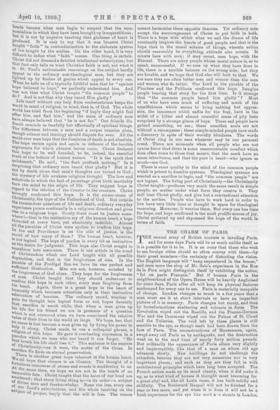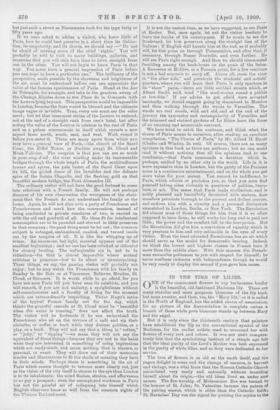THE CHARM OF PARIS.
THE annual army of British tourists is invading Paris, and for some days Paris will be as much unlike itself as it is possible for it to be. It is an irony that those who wish to see foreign cities should so often convey with them—by their great numbers—the certainty of distorting the vision. The English language will "bang sequestered in the breeze," and once more the shop of Mr. Sala's experience in the Rue de la Pau might distinguish itself by exhibiting the notice, "Id on patio Francais." But if human Paris in the neighbourhood of the Opera House will be heavily Anglicised for some days, Paris after all will keep its physical features unchanged for every one to see. Paris is materially incapable of change. London changes so much in a few years that a man must see it at short intervals or have an imperfect picture of it in memory. Paris changes but rarely, and then by transformations shattering and volcanic in force. The Revolution wiped out the Bastille, and the Franco-German War and the Commune wiped out the Palace of St. Cloud and the Tuileries. The void left by these places is still sensible to the eye, as though teeth had been drawn from the face of Paris. The reconstructions of Haussmann, again, swept away old Paris as by earthquake, and the destruction went on to the mad tune of nearly forty million pounds. But ordinarily the appearance of Paris alters very slightly and imperceptibly, like that of a man on whom old age advances slowly. New buildings do not challenge the attention, because they are not very numerous nor in very important places ; and such as they are they fall in with architectural principles whieh have long been accepted. The French nation made up its mind clearly, when it did make it up, as to what kind of houses it thought most becoming for a great city; and, like all Latin races, it has built Rainy and skilfully. The Boulevard' Raspail will not be finished for a year or two more, and yet when it is done it will not be a fresh experience for the eye like mixt n iw streets in London,
but just such a street as Haussmann took for his type forty or fifty years ago. • If we were asked to advise a visitor, who knew little of Paris, how he could best perceive in a short time its distinc-
tion, its singularity, and its charm, we should say Do not be afraid of missing some of the chief ' sights.' You will probably be told to visit so many buildings, galleries, and museums that you will only have time to drive straight from one to the other. You will not begin to know Paris in that way. You must have a general impression of Paris. before you can hope to have a particular one." The brilliancy of the perspective, made possible by the cleanness and brightness of the air, must be understood before one can appreciate the value of the famous spaciousness of Paris. Stand at the Arc de Triomphe, for example, and take in the gracious sweep of the Champs Elysees down to the Place de la Concorde with the Louvre lying beyond. This perspective would be impossible in London, because the lines would be bleared and the ultimate image vague or invisible. True, every one must see the salon car'; but let that innermost shrine of the Louvre be entered, not at the end of a straight rush from one's hotel, but after noting the value of the Louvre in relation to the rest of Paris and as a palace consummate in itself which reveals a new aspect from north, south, east, and west. Walk round it before you enter it. There are many spots from which you may have a general view of Paris,—the church of the Sacre Cur, the Eiffel Tower, or (further away) SE. Cloud and Mont-Valerien. The surprise is that you can see so much in your coup crceil : the river winding under its innumerable bridges through the whole length of Paris, the multitudinous towers and spires, the pale lustre of the Sacr6 Our upon its hill, the gilded dome of the Invades end the delicate spire of the 8ainte Chapelle, and the flashing gold on that beautiful modern bridge, the Pont Alexandre III.
The ordinary visitor will not have the good fortune to come into relations with a French family. He will not perhaps discover of his own observation the wrongness of the state- ment that the French do not understand the family or the home. Again, he will not dine with a party of Frenchmen and Frenchwomen and mark how the conversation, instead of being conducted in private conclaves of two, is carried on with the aid and goodwill of all. No ideas fit for intellectual consumption are to be pounded and starved in little preserves in that company; the good thing must be let out ; the common subject is enlarged, embroidered, exalted, and turned inside out by the tongues of all. It is like the whipping up of cream. An enormous, but light, material appears out of the smallest beginnings ; and no one has been rebuked or ridiculed for clumsy beating. The unforgivable sin is, not to be ridieulous—for that is almost impossible where mutual criticism is generous—but to be silent or unenterprising. These things, we say, the passing visitor will probably not enjoy ; hut he may watch the Frenchman with his family on Sunday in the Bois or at Vincennes, Bellevue, Meudon, St. Cloud, or Suresnes. It is worth while to go afield, for you have not seen Pates till you have seen its outskirts, and you will remark, if you are not unlucky, a sprightliness without self-consciousness and it faculty of living for the moment which are extraordinarily inspiriting. Victor Hugo's satire of the typical French family out for the day, which thinks the graceful cascade at St. Cloud must be "beautiful when the water is running," does not affect the truth. The visitor will be fortunate if he can understand the Frenchmen who sit on the to-reuse of a cafe and sip their absinthe, or coffee, or bock while they discuss politics, or a play, or a book. They will not say that a thing is "rotten," or "jolly," or "ripping "—we mean they will not say the equivalent of those things—because they are not in the habit when they are interested in something of using expressions which are ready-made, and mean nothing that is sincere, or persona], or exact. They will draw out of their memories similes and illustrations to fit the shade of meaning they have in their minds. Perhaps there is something in the air of Paris which causes thought to become more clearly cut, just as the vision of the city itself is clearer to the eye than London is to its inhabitants; the mind flashes, strains, and effervesces in so gay a prospect ; even the unemployed workman in Paris has not the painful air of collapsing into himself which English observers know so well from the common eights of the Thames Embankment. It is not the easiest time, as we have suggested, to see Paris at Easter. But, once again, let not the visitor hesitate to leave the tracks of his countrymen. If be wants to see the Boulevard, let him persevere along the straight line of the Italiens ; if English still haunts him at the end, as it probably will, let him press on through PoissonniZwe, and after that, if necessary, through Bonne Nouvelle, and even farther. He will see Paris right enough. And then we should recommend fumbling among the book-boxes on the quais of the Seine. A Rousseau or Moli6re, or a Ponesin print, for a few centimes is not a bad souvenir to carry off. Above all, cross the river to "the other side," and penetrate the students' and artists' quarters, where you will learn that Paris is only spacious in its " show " parts,—there are little cobbled streets which, as Albert Smith said, wind "like mud-worms round a pebble at low-tide." If our advice to get afield were accepted heroically, we should suggest going by steamboat to Meudon and then walking through the woods to Versailles. The woods are real woods, wild and old, and at the end of the journey the symmetry and rectangularity of Versailles and the trimmed and statued gardens of Le Notre have the force of an amazing and memorable contrast.
We have tried to catch the sunbeam, and think what the charm of Paris means to ourselves, after reading an excellent compilation, "The Charm of Paris," by Mr. Alfred H. Hyatt (Chatto and Whxdus, 2s. net). Of course, there are as many opinions in this book as there are authors ; but no one could read it without noticing that all the opinions lead to one conclusion,—that Paris commands a devotion which is, perhaps, excited by no other city in the world. Life in it is more expensive than in London, but the gaiety of the Parisian scone is a continuous entertainment, and on the whole you get more value for your money. You cannot be indifferent to Paris, which allures or provokes you, so that you soon find yourself taking sides violently in questions of politics, litera- ture, or art. The sense that Paris leads civilisation, and is nobly planned and beautifully decorated with statues, does somehow percolate through to the poorest and dullest °eerier, and endows him with a vivacity and a personal distinction unmatched in London, Berlin, or New York. The Revolution did almost none of those things for him that it is so often supposed to have done; he still works too long and is paid too little ; the power and the comfort fell to the bourgeoise. But the Revolution did give him a conviction of equality which is very precious to him and very estimable in the eyes of every visitor. Even the least educated Fnuclunan has an air which should serve as the model for democratic bearing. Indeed, we think the lowest and highest classes in France have it more than the middle class. With this manner the French- man reconciles politeness to you with respect for himself; he never confuses rudeness with independence, though he would be very ready to display the second if you gave him cause.







































 Previous page
Previous page